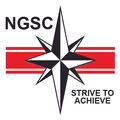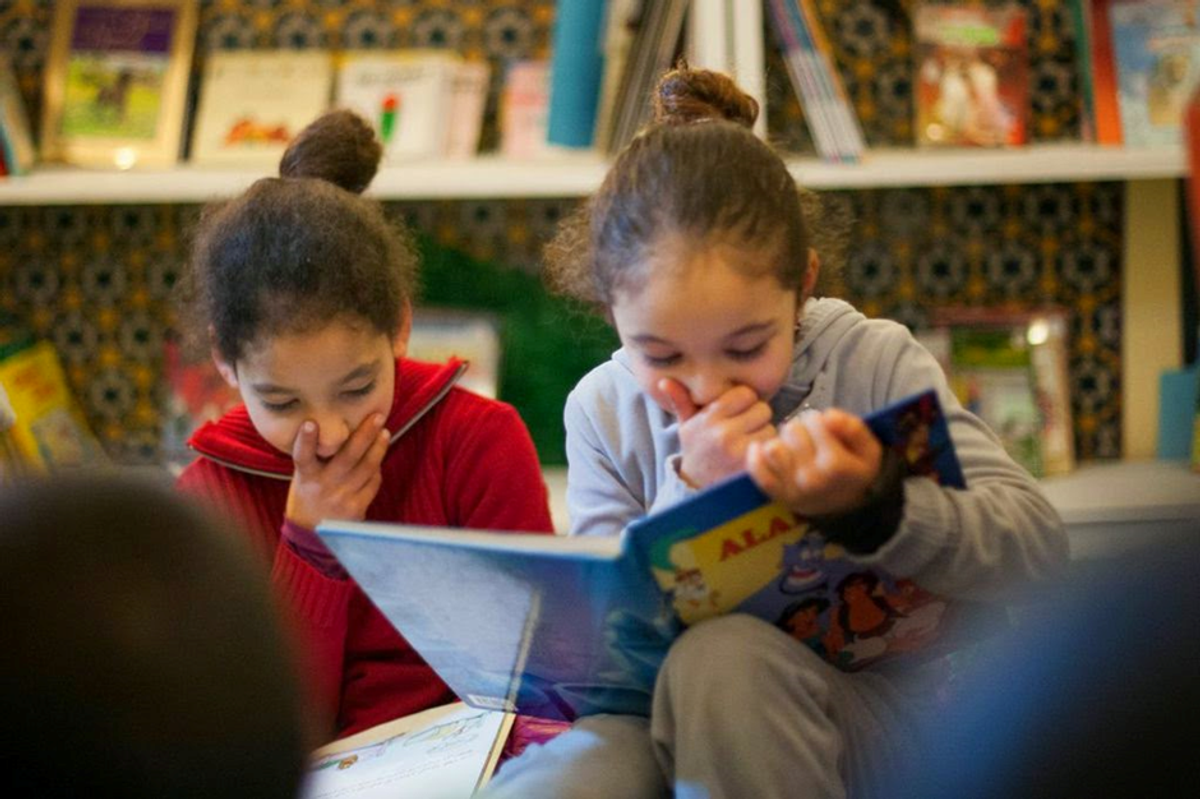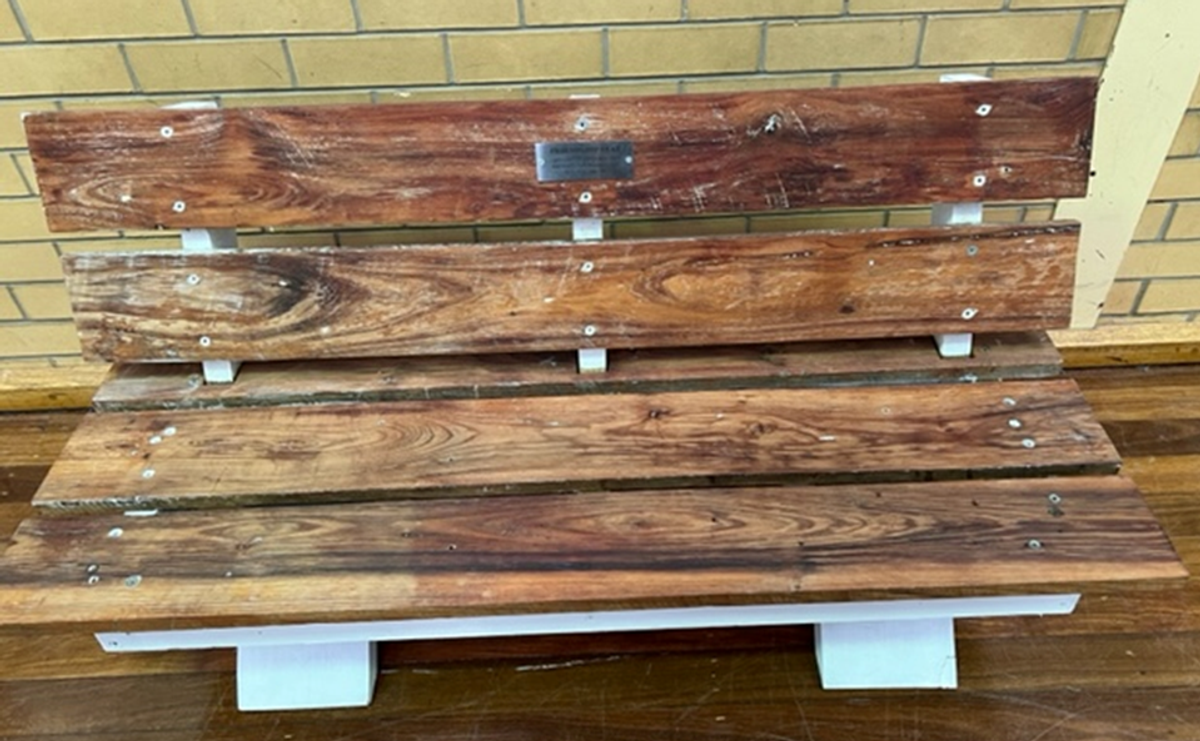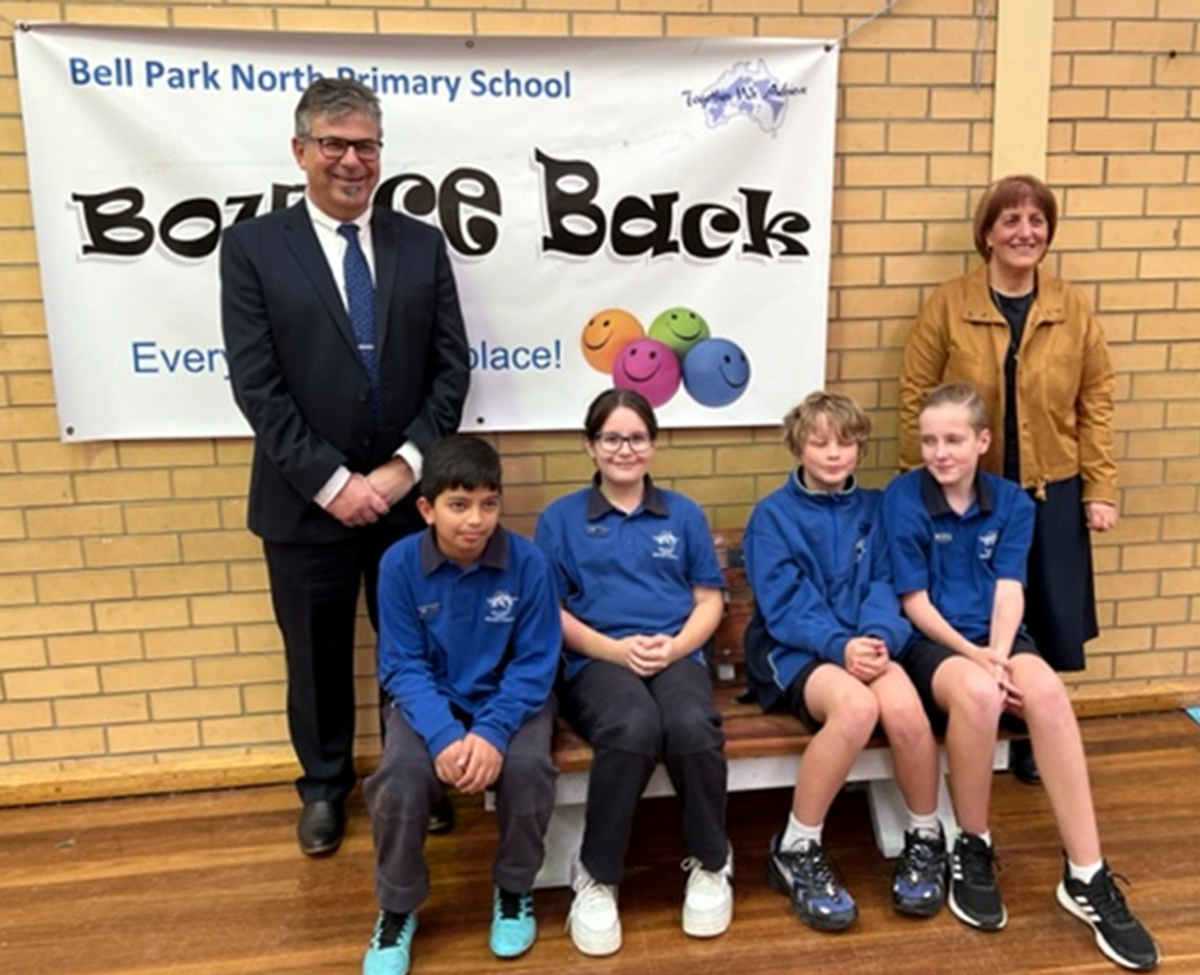PRINCIPAL'S REPORT

Nicholas Adamou
Principal
2022 Key Dates
| 10 to 16 May | NAPLAN - Years 7 to 9 students |
| 17 to 20 May | NAPLAN Catch up days |
| 17 May | School Council Meeting |
| 18 May | Curriculum Day - Student Free Day |
| 30 May to 3 June | Year 9 Morrisby Interviews |
| 6 to 10 June | Years 7 to 10 Exams |
| 13 June | Queen's Birthday Public Holiday |
| 14 to 16 June | Year 11 Exams |
| 17 June | Assessment and Report Writing Day - Student Free Day |
| 20 June | Semester Two Commences |
| 24 June | Last day of Term 2 - Students dismissed at 1:30 pm |
| 11 July | Term 3 Commences |
Welcome to Term 2
After what was a very busy first term, term two promises to be equally as busy and full of great opportunities. With most of the major events and extracurricular activities (Year 12 study camp, Year 7 Induction camp, Grade 6 Information Evening, Athletics Day, Harmony Day celebrations) to the normal schedule almost behind us, it is now time for consolidation of our work (teaching and learning) and for students to move into a settled period of study. This is a nine-week term, and Semester One ends on 17 June (End of Week Eight and One week before the end of Term Two). Semester Two will begin on 20 June, (Last week of Term Two).
We do have some significant events on our calendar during this term, including NAPLAN testing (10, 11, 13 and 14 May), Year 9 Morrisby interviews, a variety of team sports, Semester exams (6 to 16 June), several excursions, incursions, camps, extracurricular activities, Performing Arts performances.
Wishing everyone a very productive Term 2.
WHY CHOOSE A PUBLIC SCHOOL?
At this time of the year, families are making important decisions about choosing a secondary school for their child.
There is a common misleading view that if you send your child to a private school, your child will get better results.
But the facts show that this is wrong.
A review of almost 30 academic studies revealed public schools achieve similar student outcomes to Catholic and Independent schools across a range of education indicators. (Cobbold, 2015)
The review showed there were no significant differences between the results of students from public, Catholic and Independent schools in national and international tests and also in university completion rates.
According to the review, first year of university students from public schools outperform other students – they achieve higher grades in their first year of university than students from Catholic and Independent schools.
For more information about the review’s findings please go to the following website: http://www.saveourschools.com.au/public-education/studies-show-public-schools-achieve-similar-results-to-private-schools
As an educational leader in the public school system, I believe it’s important that families know about this information because it can help inform their decision-making.
Public schools are just as good as private schools in the area that matters most – developing your child’s potential. The review is one of many pieces of educational research showing that students from the same social background do as well in public schools as they do in Catholic or Independent schools.
There are other good reasons to consider enrolling your child in a public school. They include the following:
- Public schools are great value for money compared with private schools, which charge families up to $50,000 each year in tuition fees per child. Tuition at public schools is free, with families paying only for books and some essential items.
- Children in public schools learn to get on with a wide mixture of students from different backgrounds. These advanced social skills – cooperation, empathy, problem solving, understanding – are increasingly prized in the modern workplace. They equip students for success in life and in their future work.
- Public schools are neighbourhood schools. Enrolling your child in a school within walking or riding distance to home makes it easier for you to know who your child’s friends are, to make friends with other local parents and to forge closer links with your school and your community.
- High quality teaching is one of the biggest factors that influence student learning. That’s why public schools are intensifying their efforts to enhance the skills of their teachers through mentoring, peer and student feedback and other forms of professional development.
Public schools are the backbone of our nation’s education system. They express our Australian egalitarian values. They provide opportunities for all children to succeed, no matter where they live. They give all children a fair chance to reach their potential and lead a fulfilling life.
As Principal of a public school for several years, I am extremely honoured and proud of my current and previous school communities. I am also proud of the outstanding achievements of public-school students over the years.
I encourage parents/guardians to book a tour with our Transitions Leader, Ms Jacinta Eales, or a Principal Class Officer to visit the school to see it in operation. Matching your child’s needs with the right high school is crucial to your child’s future success not just at school, but also in their future pathway.
COVID 19 update
The Victorian Government has announced some important changes to COVIDSafe measures for schools that applied from the beginning of Term 2.
Face masks
Face masks, while recommended, are not required to be worn by staff or students in any school setting. This means students in grades 3 to 6, staff and visitors in primary schools are no longer required to wear face masks. Any student or staff member who wishes to wear a mask is encouraged to do so, including those who are medically at-risk.
Screening requirements
Students and staff who have tested positive for COVID-19, and have completed their 7-day isolation period, now do not need to undertake rapid antigen test (RAT) screening for 12 weeks after their release from isolation. This was previously 8 weeks.
Household contacts
Students and staff who are household contacts of a COVID-19 case are no longer required to quarantine. They can return to school as long as they undertake rapid antigen tests (RATs) 5 times within their 7-day period (one RAT test every school day for a week) and wear face masks indoors if they are aged 8 and above, unless they have a valid exemption.
If any household contact returns a positive RAT result during this period, they must isolate for 7 days and not attend school.
Vaccination requirements for visitors to schools
Parents, carers and other adult visitors (not performing work) during or after a school day, are no longer required to show evidence of two doses of COVID-19 vaccine.
Please note that vaccinations requirements remain in place for school staff and any other people working or volunteering at a school.
RAT screening program extension reminder
The supply of RATs has continued for the first 4 weeks of this term. The screening recommendations remain the same as previously (test at home twice per week).
2022 NAPLAN Testing
On Tuesday 10, Wednesday 11, Thursday 12, Friday 13 and Monday 16 May, our Year 7 and 9 students have undertaken and will undertake this year’s NAPLAN Online tests. This is the first year that our students have undertaken the NAPLAN tests online.
Why do students do NAPLAN tests?
NAPLAN is a national literacy and numeracy assessment that students in Years 3, 5, 7 and 9 sit in May each year. It is the only national assessment all Australian students do.
As students progress through their school years, it’s important to check how well they are learning the essential skills of reading, writing and numeracy.
NAPLAN assesses the literacy and numeracy skills that students are learning through the school curriculum and allows parents/carers to see how their child is progressing against national standards and over time.
NAPLAN is just one aspect of a school’s assessment and reporting process. It doesn’t replace ongoing assessments made by teachers about student performance, but it can provide teachers with additional information about students’ progress.
NAPLAN also provides schools, education authorities and governments with information about how education programs are working and whether young Australians are achieving important educational outcomes in literacy and numeracy.
Your child will do the NAPLAN tests online. Schools are transitioning from paper-based to computer-based assessments. This year our school transitioned to online testing successfully.
Online NAPLAN tests provide more precise results and are more engaging for students. One of the main benefits is tailored (or adaptive) testing, where the test presents questions which may be more or less difficult depending on a student’s responses.
Tailored testing allows a wider range of student abilities to be assessed and measures student achievement more precisely. A student’s overall NAPLAN result is based on both the number and complexity of questions they answer correctly. Your child should not be concerned if they find questions challenging; they may be taking a more complex test pathway.
What does NAPLAN assess?
NAPLAN assesses literacy and numeracy skills that students are learning through their regular school curriculum.
Students sit assessments in writing, reading, conventions of language (spelling, grammar and punctuation) and numeracy. Questions assess content linked to the Australian Curriculum: English and Mathematics.
All government and non-government education authorities have contributed to the development of NAPLAN test materials.
To find out more about NAPLAN, visit nap.edu.au
Participation in NAPLAN
NAPLAN is for everyone. ACARA supports inclusive testing so all students can participate in the national assessment program.
Adjustments are available for students with disability who have diverse functional abilities and needs.
Schools should work with parents/carers and students to identify, on a case-by-case basis, reasonable adjustments required for individual students with disability to access NAPLAN. Adjustments should reflect the support normally provided for classroom assessments.
To help inform these decisions, you may consult the NAPLAN public demonstration site, the Guide for schools to assist students with disability to access NAPLAN, or our series of videos where parents/carers, teachers and students share their experience of using NAPLAN adjustments.
In some circumstances, a student with a disability that severely limits their capacity to participate in the assessment, or a student who has recently arrived in Australia and has a non-English speaking background, may be granted a formal exemption.
What if a student is absent from school on NAPLAN days?
Where possible, schools may arrange for individual students who are absent at the time of testing to complete missed tests at another time during the school’s test schedule.
What can parents do to support their children?
Students are not expected to study for NAPLAN. Parents can support their child by reassuring them that NAPLAN is a part of their school program and reminding them to simply do their best.
ACARA does not recommend excessive preparation for NAPLAN or the use of services by coaching providers.
Some familiarisation and explanation of NAPLAN is useful to help students understand and be comfortable with the format of the tests. Teachers will ensure students are familiar with the types of questions in the tests and will provide appropriate support and guidance.
See the types of questions and tools available in the online NAPLAN assessments at nap.edu.au/online-assessment/public-demonstration-site
Who will run the tests?
NAPLAN tests are conducted at schools and administered by classroom teachers, school deputies or the principal.
How is student performance reported?
Individual student performance is shown on a national achievement scale for each assessment. A result at the national minimum standard indicates that the student has demonstrated the basic literacy and numeracy skills needed to participate fully in that year level.
A NAPLAN individual student report will be provided by the school later in the year. If you do not receive a report, you should contact the school.
How are NAPLAN test results used?
- Students and parents/carers may use individual results to discuss progress with teachers.
- Teachers use results to help identify students who need greater challenges or extra support
- Schools use results to identify strengths and areas of need to improve teaching programs, and to set goals in literacy and numeracy
- School systems use results to review programs and support offered to schools
- The community can see information about the performance of schools over time at myschool.edu.au
Where can I get more information?
For more information about NAPLAN:
- visit www.nap.edu.au
- contact the school
- contact your state or territory’s education authority
Rediscover the wonders of Reading!
The world of reading continues to change daily with the addition of digital books (eBooks), tablets, mobile apps, and many other technological alternatives.
However, the printed, hard-copy world is everywhere in our society, and it doesn’t look to be going anywhere any time soon.
Roughly one in five people in Australia suffer from reading difficulties, with many are thought to be undiagnosed or with minimal support. These people, as well as English language learners, encounter daily challenges with reading. Reading is not just for high school students or any other educational institutions, it is everywhere and unavoidable, and for those with reading difficulties it can not only be challenging but also stressful, frustrating and demoralising.
At North Geelong Secondary College, we believe in “learn to read before reading to learn” and we place a huge emphasis on both Literacy and Numeracy skills. Therefore, the school provides Literacy/Reading and Numeracy intervention programs such as ACE and STAR for all Year 7 to 9 students, ensuring that no student falls through the cracks. Students are identified through formative assessment, triangulated data and placed in the right intervention program in consultation with the parents.
The school’s ACE and STAR student results are outstanding, and many parents choose to enrol their children from primary school into Year 7, so they can access these programs. For more information re: ACE and STAR Literacy and Numeracy intervention programs please go to the school website or contact Program Leaders Mr Brad Smallman (Literacy) and Mr Ryan Mills (Numeracy).
The school has also introduced another innovative program directly related to Reading which is part of the English curriculum (Four plus One). All students in Years 7 to 9 participate in a Reading Program with a Reading Specialist teacher once a week. Age-appropriate books in a variety of levels and interests are provided to our students where, in a supportive and systematic way, are read throughout the year with a Reading specialist in front of each reading class.
The school community prides itself on improving students learning and future pathways/lives and of course mastering reading, as mentioned above, is the bedrock for success in anything our students choose to pursue.
Friendship Seat
In 2021, the Senior VCAL students under the guidance of Ms Astles, VCAL Teacher, and with the support of Mr Scoullar, Woodwork Teacher, decided to construct a friendship seat/bench and donate it to Bell Park North Primary School (BPNPS) in the spirit of friendship and cooperation.
Unfortunately, last year, due to Covid-19 and the lock downs, the Year 12 VCAL students were not able to visit the primary school to present this gift. This year I was privileged to be invited to the BPNPS assembly on Friday 6 May and in front of the students, parents and staff I presented the Friendship Seat to their community. BPNPS Student Leaders thanked our Senior VCAL students for this very practicable gift.
Above “Friendship Seat” constructed by the 2021 Senior VCAL NGSC students and donated to BPNPS and below BPNPS School Captains, Principal Ms Lagadinos and Mr Adamou at Friday’s school assembly.





